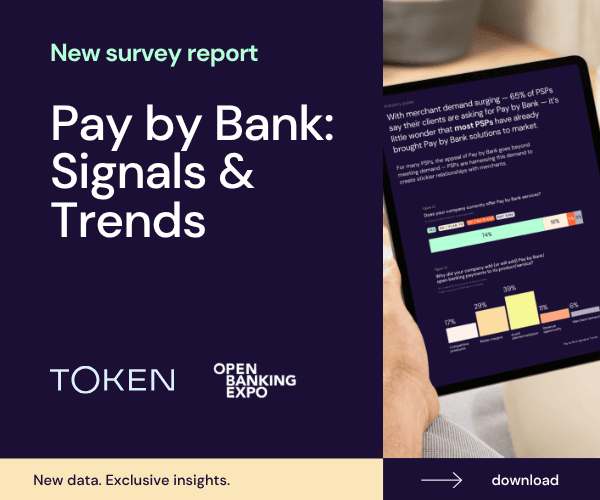

Q&A: Token.io’s Lea Siering on instant payments, sustainability and gender diversity
Ellie Duncan | Insights, News, Women In Open Banking
28 Mar 2024
Lea Siering, chief risk and compliance officer, and managing director at Token.io, tells Open Banking Expo about the challenges facing Europe with instant payment regulation on the horizon, and what it will take for women to be equally represented in the industry.
1. What does the future of payments/Pay by Bank look like in Europe broadly, particularly in light of the recent instant payment legislation?
The future looks very bright, as new instant payment regulation will give a huge boost to Pay by Bank here in Continental Europe.
Currently, some consumers are faced with fees when they choose to pay with SEPA Instant Payments. But imagine, for example, buying a pair of sneakers online and you have an opportunity to easily and securely pay for these sneakers without any additional fees — this is exactly what we need to observe a boost in Pay by Bank for ecommerce.
I love the new instant payments regulation. However, I have some concerns about whether eurozone banks will deliver within the 18-month period that has been set by the European Parliament. When you speak to some banks, they are lobbying against this change because, for them, it’s a huge effort, and banks still have to be convinced there is upside in it. But, I think, the future of payments and Pay by Bank will be bright. I’m confident Pay by Bank will gain a considerable market share and we’ll be able to compete with traditional payment methods like PayPal, credit cards, and also, buy now, pay later (BNPL).
2. Given that you’re based in Germany, what shifts in payments are you observing in Germany?
Germany is a PayPal country, followed by BNPL, invoice, and then credit cards. PayPal gained market share as they were the only payment service provider for eBay, which was very popular a few years ago. Through eBay, the German consumer learned to use and to trust in PayPal and realised it’s a great way to pay because it’s easy and convenient. PayPal also does great marketing with their consumer protection.
Therefore, whereas in other European countries we expect Pay by Bank to replace traditional payment methods like cards, in Germany Pay by Bank will primarily be competing with PayPal.

Token.io’s Lea Siering
3. Are there any challenges specific to Germany, and how is Token.io addressing these?
The challenges specifically for merchants in Germany are the dependency on, and costs associated with, traditional payment methods. Token.io is able to provide a solution to these issues. First of all, we are less expensive than other payment methods because Pay by Bank is a leaner way to pay. With A2A payments there are very few intermediaries involved in processing a payment, and Token.io eliminates intermediaries further by building and maintaining all of our own connections to banks in-house.
We also give merchants the opportunity to launch their own Pay by Bank method. Our solution is a white-label solution that can be customised, so merchants can stay closer to the end consumer. Going back to PayPal, which I would consider A2A payments’ main competitor in ecommerce in Germany, the ability to whitelabel means the merchant (not Token.io, PayPal, or any other infrastructure or service provider) can ‘own’ the payment process as well.
One more important consideration is that Germans appreciate security. They are not very fast movers when it comes to adapting, or changing, their consumer behaviours. I am based in Berlin and still, in a lot of places, be it shops or restaurants, you have to pay with cash. Everything takes a bit longer in Germany.
4. Can payments and sustainability go hand in hand? For example, can Pay by Bank be considered a ‘green’ payment method?
To answer your question, payments and sustainability do not go hand-in-hand, but they must go hand-in-hand.
Is Pay by Bank a green payment method? It depends where the energy comes from to initiate this payment. It has so many components you need to take into consideration but, for sure, the answer is yes, it can be the case.
A lot of people in the payment industry say it doesn’t make a difference. They ask: why do you bring up sustainability and payments?
But, I believe this approach is entirely wrong because every single effort to address the climate crisis counts. Considering the volume of payments being generated, and the amount of energy we are using to make those payments, it is worth rethinking the way we are doing it.
There hasn’t been an official study published on this to date. But, we know account-to-account payments are the leanest way to pay because we are transferring money directly from one bank account to another. There is only one entity in between that is initiating this payment through an API, so it’s a no-brainer that this is the leanest and most efficient way to pay — and therefore could have the lowest emissions. At least, that is our current assumption, which needs to be verified. To truly prove this claim, you would need to assess the core banking of each and every bank you connect to, which will take time and cooperation.
5. At Open Banking Expo, our Women in Open Banking initiative aims to champion women across the industry. Have you observed any changes in female representation, either positive or negative, during your career so far?
I’ve been working in the industry now for 15 years and my answer, up until recently, would have been ‘yes’ due to some initiatives, like Women in Open Banking, and similar initiatives in Germany. The networking component is working quite well.
However, I recently came back from a conference in Dusseldorf and, except for two women, it was around 98% male participants.
I think in Berlin we pay more attention to having diverse panels at events, for example. We try to invite women and give them the opportunity to gain visibility, but there is still a long way to go because networking is not enough. We need to push our colleagues to the next level.
Female colleagues can be better performing than male colleagues but – and this is what I have observed in my career – in most cases, male colleagues get promoted. Maybe it is because women do not ask for the promotion, maybe they question themselves. Either way, I think there is still a long way to go and networking alone is not enough.
If there is a position that could be filled by a female, we need to ensure that female colleagues in companies get promoted.
6. What would you like to see the industry do to achieve a more diverse talent pool in Open Banking payments?
Exactly what [Open Banking Expo] are doing with Women in Open Banking – you give women visibility. Every woman needs to commit to supporting women. If every woman in a leadership position supports five others, then in 10 years we are in safe hands.
Further reading: Bringing the benefits of Variable Recurring Payments to life by Ben Rattue, product partnerships and propositions manager at Token.io



